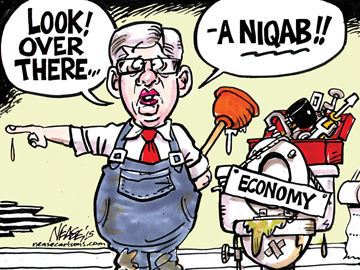
Isak has begun a series of posts on this blog under the rubric “Upon Further Review.” He explains this project of gathering and analyzing the allegations of “fouls” on the campaign trail this winter and spring on the Presidential campaign trail here, and he continues here (and elsewhere “above” this post in the near future, no doubt). His rubric borrows the language of video-replay officials in American football, and other sports, who take a slow-motion second look at calls they used to be able to make only on the fly.
Canada went through its own federal election in the fall of 2015, and in later stages of that election the then-governing Conservative Party was accused of “playing the race card” — albeit in coded language that might appear almost quaint when compared to the game played by the current frontrunner in the Republican primaries. (I say almost, because it would not have appeared quaint to those whom these Conservative tactics were attempting to stigmatize.) And when they did play the card, Canada’s leading political philosopher, Joe Heath (University of Toronto), called them on it in this post on his blog In Due Course.
Those tracking the US campaign these days should find plenty of useful analysis in Heath’s post: from an excellent summary on why democracies thrive on “reasonable disagreements,” to how we decide when certain tactics that exploit unreasonable disagreements must be considered “beyond the pale.” The cartoon below captures some of Heath’s argument for why certain ways of playing the game of politics fall short of our minimal standards of “political sportsmanship.” (For those unfamiliar, a “niqab” is what the hockey player in the cartoon at the head of this post is wearing.)

Heath begins like this:
One of the most important concepts in modern democratic politics is that of “reasonable disagreement.” There are a number of different principles or values that most of us subscribe to, at some level, but in cases where they conflict, it is not entirely obvious how they should be ordered. When should public welfare be assigned priority over personal freedom? How much loss of welfare should be accepted in order to promote greater equality? These are the sorts of questions that define the zone of reasonable disagreement in modern politics. The central distinguishing feature of the right-to-left spectrum of political parties is that they propose different answers to these questions, with the right putting more emphasis on personal freedom, the left more emphasis on equality, and the centre focusing on maximizing welfare. This naturally translates into different views about the role of government in society.
The disagreement is “reasonable” because the underlying principles are ones that are very broadly accepted – they are in fact foundational for a liberal democratic society – the disagreement is more one of emphasis.
And ends like this:
…after Friday’s press conference, I can no longer regard it as morally acceptable for anyone to vote for the Conservative Party of Canada. A week ago, I could still persuade myself that reasonable people could disagree over how to vote in this election, but no longer.
As they say on the sites that troll followers with clickbait: you won’t believe what those mild-mannered Canadian Conservative politicians said during that press conference last fall. But seriously: if you’re looking for guidance on how a committed Republican should vote if Donald Trump is the GOP’s nominee, click into Heath’s post.
